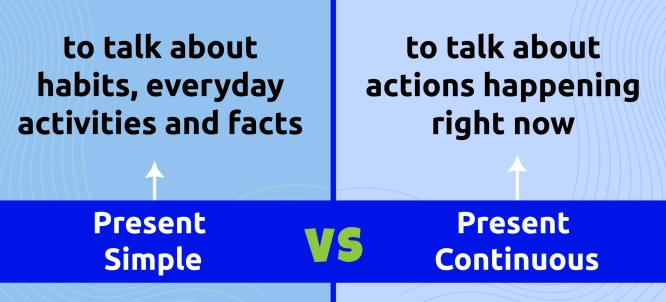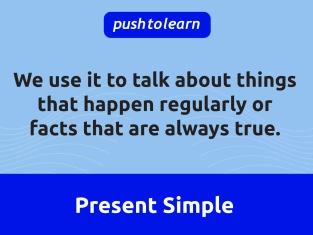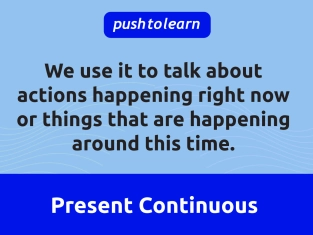by PushtoLearn
Present Simple vs Present Continuous
Table of Contents
- Present Simple vs Present Continuous - Exercises and Quiz
- Differences Between Present Simple and Present Continuous
- When to Use the Present Simple
- When to Use the Present Continuous
- How to Form the Present Simple and Present Continuous
- Key Differences and Examples
- Common Mistakes and How to Fix Them
- Everyday Use of Present Simple and Present Continuous
- Practice Sentences
- FAQ
Present Simple vs Present Continuous - Exercises and Quiz
These exercises focus on using Present Simple and Present Continuous for different actions.
Differences Between Present Simple and Present Continuous
|
Tense |
When to Use It |
Example Sentence |
|
Present Simple |
For habits, routines, and general facts |
I eat breakfast every morning. |
|
Present Continuous |
For actions happening right now or temporary situations |
I am eating breakfast right now. |

When to Use the Present Simple
-
For routines and habits (things you do regularly).
Example: I go to school every day. -
For facts and general truths (things that are always true).
Example: Water boils at 100°C. -
For schedules or fixed events.
Example: The bus leaves at 8:00 AM.
Time Expressions Used with Present Simple:
-
Every day, usually, often, sometimes, always:
-
I always wake up at 7 AM.
-
They often play soccer on Sundays.
When to Use the Present Continuous
-
For actions happening right now (at this moment).
Example: I am studying English right now. -
For temporary actions or situations (things happening around this time, but not always).
Example: He is living in London for a few months. -
For future plans (with a specific time or arrangement).
Example: We are meeting our friends tonight.
Time Expressions Used with Present Continuous:
-
Now, right now, at the moment, today, this week:
-
She is reading a book right now.
-
We are traveling this week.
How to Form the Present Simple and Present Continuous
Present Simple Structure:
-
Subject + base verb (add -s/-es for he/she/it).
Example: She works at a hospital.
Present Continuous Structure:
-
Subject + am/is/are + verb + -ing.
Example: They are playing in the park.
|
Subject |
Present Simple Example |
Present Continuous Example |
|
I |
I like pizza. |
I am eating pizza. |
|
He / She / It |
He plays football. |
He is playing football. |
|
We / You / They |
They watch TV. |
They are watching TV now. |
Key Differences and Examples
-
Routine vs. Now:
-
Present Simple: She watches TV every evening. (A routine)
-
Present Continuous: She is watching TV right now. (Happening now)
-
General Fact vs. Temporary Action:
-
Present Simple: He lives in Spain. (He lives there permanently)
-
Present Continuous: He is living in Spain for the summer. (Temporary situation)
-
Regular Action vs. Action Happening Now:
-
Present Simple: I study English every day. (Habit)
-
Present Continuous: I am studying English right now. (Action happening at the moment)
Common Mistakes and How to Fix Them
-
Mixing up the tenses:
-
Incorrect: I am liking ice cream. (We don’t use the Present Continuous for feelings or likes/dislikes)
-
Correct: I like ice cream.
-
Using Present Simple for actions happening now:
-
Incorrect: He plays soccer now.
-
Correct: He is playing soccer now.
-
Forgetting to add -s/-es for he/she/it in Present Simple:
-
Incorrect: She work at a school.
-
Correct: She works at a school.
-
Forgetting the -ing in Present Continuous:
-
Incorrect: We are play soccer.
-
Correct: We are playing soccer.
Everyday Use of Present Simple and Present Continuous
-
Present Simple: I brush my teeth every morning. (Routine)
-
Present Continuous: I am brushing my teeth now. (Happening right now)
Practice Sentences
|
Present Simple |
Present Continuous |
|
I eat lunch at 12 PM every day. |
I am eating lunch right now. |
|
She goes to school by bus. |
She is going to school now. |
|
They play soccer on Sundays. |
They are playing soccer today. |
FAQ
When do I use the Present Simple?
Use the Present Simple for routines, habits, general facts, and schedules. For example: "I study English every day."
When do I use the Present Continuous?
Use the Present Continuous for actions happening right now or temporary situations. For example: "I am studying English right now."
How do I make a Present Simple sentence?
Use the base form of the verb (add -s/-es for he/she/it). Example: "She drinks tea."
How do I make a Present Continuous sentence?
Use am/is/are + the verb + -ing. Example: "They are playing soccer."
Can I use the Present Continuous for future plans?
Yes! You can use the Present Continuous for future plans with a specific time. Example: "We are meeting tomorrow."

